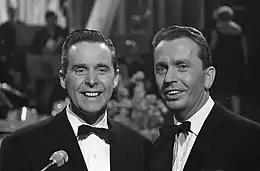De Spelbrekers
De Spelbrekers (The Spoilsports) were a Dutch singing duo, consisting of Theo Rekkers (24 April 1924 – 20 April 2012) and Huug Kok (19 February 1918 – 27 October 2011).[1] They were known for their participation in the Eurovision Song Contest 1962, representing the Netherlands.
| De Spelbrekers | |
|---|---|
 De Spelbrekers in 1962 | |
| Background information | |
| Members |
|
Career
1940s and 1950s
Rekkers and Kok met during World War II at a munitions factory in Bremen, Germany, where they were working as forced labourers. They formed De Spelbrekers in 1945, after the war had ended.[2] Their recording career began in 1950, and they released numerous singles during the decade, the most successful being "Oh wat ben je mooi" which reached #5 in the Dutch charts in 1956.[3]
Eurovision Song Contest
In 1962, De Spelbrekers took part in the Dutch national selection for the Eurovision Song Contest, and won with the song "Katinka". They went on to participate in the Eurovision Song Contest 1962, held in Luxembourg City on 18 March.[4] In a field of 16 contestants, "Katinka" was one of four songs (the others being the entries from Belgium, Spain and Austria) which failed to score. This was the first year in which any songs had failed to register at all on the Eurovision scoreboard.[5] Nevertheless, "Katinka" proved a success within the Netherlands, and has gone on to become one of the country's better-remembered and recognised Eurovision entries.[6]
Later career
The duo never managed to recapture the success of "Oh wat ben je mooi" and "Katinka", and after years of releasing further singles to ever-declining interest, they decided in the mid 1970s to move into music management, their clients including André van Duin, Ben Cramer and Saskia & Serge.[2]
References
External links
![]() Media related to De Spelbrekers at Wikimedia Commons
Media related to De Spelbrekers at Wikimedia Commons
| Awards and achievements | ||
|---|---|---|
| Preceded by Greetje Kauffeld with "Wat een dag" |
Netherlands in the Eurovision Song Contest 1962 |
Succeeded by Annie Palmen with "Een speeldoos" |